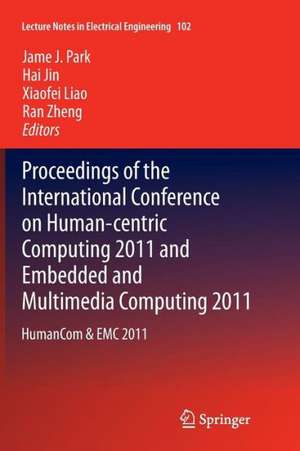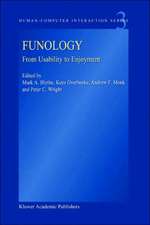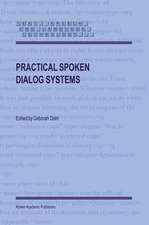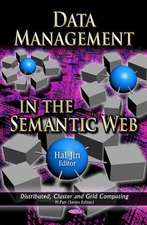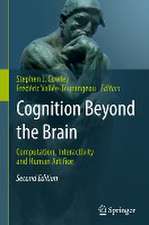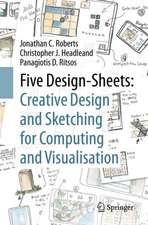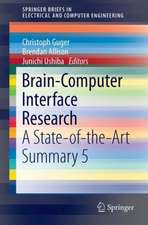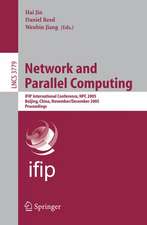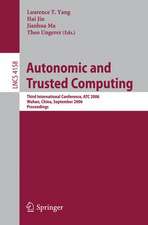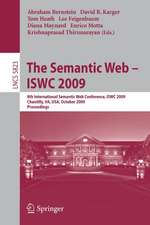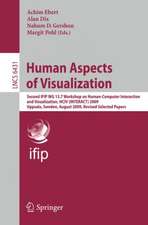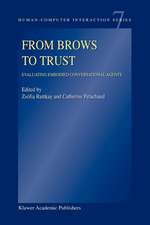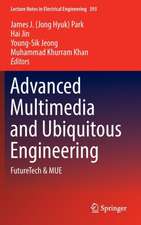Proceedings of the International Conference on Human-centric Computing 2011 and Embedded and Multimedia Computing 2011: HumanCom & EMC 2011: Lecture Notes in Electrical Engineering, cartea 102
Editat de James J. Park, Hai Jin, Xiaofei Liao, Ran Zhengen Limba Engleză Paperback – 27 noi 2013
Human-centric computing is to create novel solutions so that the humans are always connected, portable, and available. As with pervasive-computing, human-centric computing requires a variety of devices; however, such devices exist simply to obtain inputs from the human and are embedded in objects that humans interact with on a daily basis. Moreover, during the past couple of decades, Information Science technologies influenced and changed every aspect of our lives and our cultures. Without various Information Science technology-based applications, it would be difficult to keep information stored securely, to process information efficiently, and to communicate conveniently.
Embedded computing ranges from portable devices such as digital watches and MP3 players, to large stationary installations like traffic lights, factory controllers, or the systems controlling nuclear power plants. Complexity varies from low, with a single microcontroller chip, to very high with multiple units, peripherals and networks mounted inside a large chassis or enclosure.
Multimedia computing covers multimedia I/O devices, OS, storage systems, streaming media middleware, continuous media representations, media coding, media processing, etc., and also includes multimedia communications; real-time protocols, end-to-end streaming media, resource allocation, multicast protocols, and multimedia applications; databases, distributed collaboration, video conferencing, 3D virtual environments.
| Toate formatele și edițiile | Preț | Express |
|---|---|---|
| Paperback (1) | 1191.63 lei 38-45 zile | |
| SPRINGER NETHERLANDS – 27 noi 2013 | 1191.63 lei 38-45 zile | |
| Hardback (1) | 1296.18 lei 6-8 săpt. | |
| SPRINGER NETHERLANDS – 21 iul 2011 | 1296.18 lei 6-8 săpt. |
Din seria Lecture Notes in Electrical Engineering
- 18%
 Preț: 1859.04 lei
Preț: 1859.04 lei - 18%
 Preț: 895.27 lei
Preț: 895.27 lei - 17%
 Preț: 397.66 lei
Preț: 397.66 lei - 18%
 Preț: 1562.17 lei
Preț: 1562.17 lei - 20%
 Preț: 1473.39 lei
Preț: 1473.39 lei - 18%
 Preț: 5169.60 lei
Preț: 5169.60 lei - 20%
 Preț: 1741.49 lei
Preț: 1741.49 lei - 20%
 Preț: 1918.04 lei
Preț: 1918.04 lei - 18%
 Preț: 1573.20 lei
Preț: 1573.20 lei - 18%
 Preț: 1851.77 lei
Preț: 1851.77 lei - 18%
 Preț: 1578.72 lei
Preț: 1578.72 lei - 18%
 Preț: 1903.08 lei
Preț: 1903.08 lei - 18%
 Preț: 2113.02 lei
Preț: 2113.02 lei - 18%
 Preț: 892.42 lei
Preț: 892.42 lei - 18%
 Preț: 1404.30 lei
Preț: 1404.30 lei - 18%
 Preț: 1133.61 lei
Preț: 1133.61 lei - 18%
 Preț: 1847.84 lei
Preț: 1847.84 lei - 18%
 Preț: 1384.56 lei
Preț: 1384.56 lei - 20%
 Preț: 1300.14 lei
Preț: 1300.14 lei - 20%
 Preț: 1174.76 lei
Preț: 1174.76 lei - 20%
 Preț: 1310.03 lei
Preț: 1310.03 lei - 18%
 Preț: 2546.29 lei
Preț: 2546.29 lei - 20%
 Preț: 1310.03 lei
Preț: 1310.03 lei - 18%
 Preț: 1676.58 lei
Preț: 1676.58 lei - 20%
 Preț: 1182.20 lei
Preț: 1182.20 lei - 18%
 Preț: 1392.46 lei
Preț: 1392.46 lei - 18%
 Preț: 1119.38 lei
Preț: 1119.38 lei - 18%
 Preț: 1678.16 lei
Preț: 1678.16 lei - 18%
 Preț: 1596.85 lei
Preț: 1596.85 lei - 18%
 Preț: 1398.00 lei
Preț: 1398.00 lei - 20%
 Preț: 1445.35 lei
Preț: 1445.35 lei - 18%
 Preț: 1244.89 lei
Preț: 1244.89 lei - 20%
 Preț: 1173.10 lei
Preț: 1173.10 lei - 18%
 Preț: 810.81 lei
Preț: 810.81 lei - 20%
 Preț: 1173.93 lei
Preț: 1173.93 lei - 20%
 Preț: 1482.47 lei
Preț: 1482.47 lei - 20%
 Preț: 1915.57 lei
Preț: 1915.57 lei - 18%
 Preț: 1387.73 lei
Preț: 1387.73 lei - 18%
 Preț: 1425.62 lei
Preț: 1425.62 lei - 20%
 Preț: 1297.67 lei
Preț: 1297.67 lei - 18%
 Preț: 1407.46 lei
Preț: 1407.46 lei - 18%
 Preț: 1667.91 lei
Preț: 1667.91 lei - 18%
 Preț: 1400.35 lei
Preț: 1400.35 lei - 18%
 Preț: 1117.03 lei
Preț: 1117.03 lei - 18%
 Preț: 1573.20 lei
Preț: 1573.20 lei - 18%
 Preț: 1405.90 lei
Preț: 1405.90 lei - 18%
 Preț: 726.37 lei
Preț: 726.37 lei - 18%
 Preț: 1405.90 lei
Preț: 1405.90 lei - 18%
 Preț: 1238.56 lei
Preț: 1238.56 lei - 18%
 Preț: 725.61 lei
Preț: 725.61 lei
Preț: 1191.63 lei
Preț vechi: 1489.54 lei
-20% Nou
Puncte Express: 1787
Preț estimativ în valută:
228.01€ • 238.07$ • 188.71£
228.01€ • 238.07$ • 188.71£
Carte tipărită la comandă
Livrare economică 31 martie-07 aprilie
Preluare comenzi: 021 569.72.76
Specificații
ISBN-13: 9789400737136
ISBN-10: 9400737130
Pagini: 660
Ilustrații: XXV, 631 p.
Dimensiuni: 155 x 235 x 35 mm
Greutate: 0.91 kg
Ediția:2011
Editura: SPRINGER NETHERLANDS
Colecția Springer
Seria Lecture Notes in Electrical Engineering
Locul publicării:Dordrecht, Netherlands
ISBN-10: 9400737130
Pagini: 660
Ilustrații: XXV, 631 p.
Dimensiuni: 155 x 235 x 35 mm
Greutate: 0.91 kg
Ediția:2011
Editura: SPRINGER NETHERLANDS
Colecția Springer
Seria Lecture Notes in Electrical Engineering
Locul publicării:Dordrecht, Netherlands
Public țintă
ResearchCuprins
Keynote Speech.- HumanCom 2011.- Session 1: Computer-assisted Learning, Cognition and Semantic Systems.- Session 2: Human-computer Interaction and Social Computing.- Session 3: Network or distributed algorithms, applications.- Session 4: Privacy, Security and trust management.- Session 5: Ubiquitous computing, mobile systems and applications.- Session 6:Virtualization Technologies for Desktop Applications.- EMC 2011.- Session 1: Cyber-Physical Systems and Real-time systems.- Session 2: Distributed Multimedia Systems.- Session 3: Embedded Systems, Software and Applications.- Session 4: Multimedia Computing & Intelligent Services.- PDC 2011.- ENC 2011.
Notă biografică
Jong Hyuk Park received his Ph.D. degree in Graduate School of Information Security from Korea University, Korea. From December, 2002 to July, 2007, Dr. Park had been a research scientist of R&D Institute, Hanwha S&C Co., Ltd., Korea. From September, 2007 to August, 2009, He had been a professor at the Department of Computer Science and Engineering, Kyungnam University, Korea. He is now a professor at the Department of Computer Science and Engineering, Seoul National University of Science and Technology (SeoulTech), Korea. Dr. Park has published about 100 research papers in international journals and conferences. He has been serving as chairs, program committee, or organizing committee chair for many international conferences and workshops. He is President of the Future Technology Research Association International (FTRA) and Korea Information Technology Convergence Society (KITCS). He is editor-in-chief of International Journal of Information Technology, Communications and Convergence (IJITCC), InderScience and Journal of Convergence (JoC), FTRA Publishing. He is Associate Editor / Editor of 14 international journals including 8 journals indexed by SCI(E). In addition, he has been serving as a Guest Editor for international journals by some publishers: Springer, Elsevier, John Wiley, Oxford Univ. press, Hindawi, Emerald, Inderscience. His research interests include security and digital forensics, ubiquitous and pervasive computing, context awareness, multimedia services, etc. He got the best paper award in ISA-08 conference and the outstanding leadership awards from IEEE HPCC-09 and ICA3PP-10. Dr. Park' s research interests include Digital Forensics, Security, Ubiquitous and Pervasive Computing, Context Awareness, Multimedia Service, etc. He is a member of the IEEE, IEEE Computer Society, KIPS, KICS, KIISC, KMMS, KDFS and KIIT.
Hai Jin is a Cheung Kung Scholars Chair Professor of computer science and engineering at theHuazhong University of Science and Technology (HUST) in China. He is now Dean of the School of Computer Science and Technology at HUST. Jin received his PhD in computer engineering from HUST in 1994. In 1996, he was awarded a German Academic Exchange Service fellowship to visit the Technical University of Chemnitz in Germany. Jin worked at The University of Hong Kong between 1998 and 2000, and as a visiting scholar at the University of Southern California between 1999 and 2000. He was awarded Excellent Youth Award from the National Science Foundation of China in 2001. Jin is the chief scientist of ChinaGrid, the largest grid computing project in China, and the chief scientist of National 973 Basic Research Program Project of Virtualization Technology of Computing System.
Jin is a senior member of the IEEE and a member of the ACM. Jin is the member of Grid Forum Steering Group (GFSG). He has co-authored 15 books and published over 400 research papers. His research interests include computer architecture, virtualization technology, cluster computing and grid computing, peer-to-peer computing, network storage, and network security.
Jin is the steering committee chair of International Conference on Grid and Pervasive Computing (GPC), Asia-Pacific Services Computing Conference (APSCC), International Conference on Frontier of Computer Science and Technology (FCST), and Annual ChinaGrid Conference. Jin is a member of the steering committee of the IEEE/ACM International Symposium on Cluster Computing and the Grid (CCGrid), the IFIP International Conference on Network and Parallel Computing (NPC), and the International Conference on Grid and Cooperative Computing (GCC), International Conference on Autonomic and Trusted Computing (ATC), International Conference on Ubiquitous Intelligence and Computing (UIC).
Xiaofei Liao received a Ph.D degree in computer science and engineering from Huazhong University of Science and Technology (HUST), China, in 2005. He is now an associate professor in school of Computer Science and Engineering at HUST. He has served as a reviewer for many conferences and journal papers. His research interests are in the areas of virtualization technology for computing system, peer-to-peer system, cluster computing and streaming services. He is a member of the IEEE and the IEEE Computer Society.
Ran Zheng received a Ph.D degree in computer science and engineering from Huazhong University of Science and Technology (HUST), China, in 2006. She is now an associate professor in school of Computer Science and Engineering at HUST. Her research interests are in the areas of high performance computing and its applications, image processing.
Hai Jin is a Cheung Kung Scholars Chair Professor of computer science and engineering at theHuazhong University of Science and Technology (HUST) in China. He is now Dean of the School of Computer Science and Technology at HUST. Jin received his PhD in computer engineering from HUST in 1994. In 1996, he was awarded a German Academic Exchange Service fellowship to visit the Technical University of Chemnitz in Germany. Jin worked at The University of Hong Kong between 1998 and 2000, and as a visiting scholar at the University of Southern California between 1999 and 2000. He was awarded Excellent Youth Award from the National Science Foundation of China in 2001. Jin is the chief scientist of ChinaGrid, the largest grid computing project in China, and the chief scientist of National 973 Basic Research Program Project of Virtualization Technology of Computing System.
Jin is a senior member of the IEEE and a member of the ACM. Jin is the member of Grid Forum Steering Group (GFSG). He has co-authored 15 books and published over 400 research papers. His research interests include computer architecture, virtualization technology, cluster computing and grid computing, peer-to-peer computing, network storage, and network security.
Jin is the steering committee chair of International Conference on Grid and Pervasive Computing (GPC), Asia-Pacific Services Computing Conference (APSCC), International Conference on Frontier of Computer Science and Technology (FCST), and Annual ChinaGrid Conference. Jin is a member of the steering committee of the IEEE/ACM International Symposium on Cluster Computing and the Grid (CCGrid), the IFIP International Conference on Network and Parallel Computing (NPC), and the International Conference on Grid and Cooperative Computing (GCC), International Conference on Autonomic and Trusted Computing (ATC), International Conference on Ubiquitous Intelligence and Computing (UIC).
Xiaofei Liao received a Ph.D degree in computer science and engineering from Huazhong University of Science and Technology (HUST), China, in 2005. He is now an associate professor in school of Computer Science and Engineering at HUST. He has served as a reviewer for many conferences and journal papers. His research interests are in the areas of virtualization technology for computing system, peer-to-peer system, cluster computing and streaming services. He is a member of the IEEE and the IEEE Computer Society.
Ran Zheng received a Ph.D degree in computer science and engineering from Huazhong University of Science and Technology (HUST), China, in 2006. She is now an associate professor in school of Computer Science and Engineering at HUST. Her research interests are in the areas of high performance computing and its applications, image processing.
Textul de pe ultima copertă
Proceedings of the International Conference on Human-centric Computing and Embedded and Multimedia Computing (HumanCom & EMC 2011) will cover topics of HumanCom and EMC, the current hot topics satisfying the world-wide ever-changing needs.
Human-centric computing is to create novel solutions so that the humans are always connected, portable, and available. As with pervasive-computing, human-centric computing requires a variety of devices; however, such devices exist simply to obtain inputs from the human and are embedded in objects that humans interact with on a daily basis. Moreover, during the past couple of decades, Information Science technologies influenced and changed every aspect of our lives and our cultures. Without various Information Science technology-based applications, it would be difficult to keep information stored securely, to process information efficiently, and to communicate conveniently.
Embedded computing ranges from portable devices such as digital watches and MP3 players, to large stationary installations like traffic lights, factory controllers, or the systems controlling nuclear power plants. Complexity varies from low, with a single microcontroller chip, to very high with multiple units, peripherals and networks mounted inside a large chassis or enclosure.
Multimedia computing covers multimedia I/O devices, OS, storage systems, streaming media middleware, continuous media representations, media coding, media processing, etc., and also includes multimedia communications; real-time protocols, end-to-end streaming media, resource allocation, multicast protocols, and multimedia applications; databases, distributed collaboration, video conferencing, 3D virtual environments.
Human-centric computing is to create novel solutions so that the humans are always connected, portable, and available. As with pervasive-computing, human-centric computing requires a variety of devices; however, such devices exist simply to obtain inputs from the human and are embedded in objects that humans interact with on a daily basis. Moreover, during the past couple of decades, Information Science technologies influenced and changed every aspect of our lives and our cultures. Without various Information Science technology-based applications, it would be difficult to keep information stored securely, to process information efficiently, and to communicate conveniently.
Embedded computing ranges from portable devices such as digital watches and MP3 players, to large stationary installations like traffic lights, factory controllers, or the systems controlling nuclear power plants. Complexity varies from low, with a single microcontroller chip, to very high with multiple units, peripherals and networks mounted inside a large chassis or enclosure.
Multimedia computing covers multimedia I/O devices, OS, storage systems, streaming media middleware, continuous media representations, media coding, media processing, etc., and also includes multimedia communications; real-time protocols, end-to-end streaming media, resource allocation, multicast protocols, and multimedia applications; databases, distributed collaboration, video conferencing, 3D virtual environments.
Caracteristici
Human-centric computing is to create novel solutions so that the humans are always connected, portable, and available HumanCom’s topics cover the current hot topics satisfying the world-wide ever-changing needs Convergence topics on Human-Centric, Embedded, and Multimedia Computing
